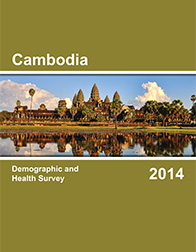Spotlight on Implementing Agencies: Cambodia
Names: Phan Chinda, They Kheam, and Chhay Satia of the National Institute of Statistics/Ministry of Planning; Sok Kosal, Loun Mondol, and Lam Phirun of the Directorate General for Health/Ministry of Health; and Sarah Balian of The DHS Program
Country of origin: Cambodia
When not working, favorite place to visit:
Lom Phirun: Washington, DC.
What has been the nicest surprise visiting The DHS Program HQ?
Chhay Satia: It’s a nice place with friendly people.
What do you miss most about home when you are here?
Loun Mondol: Food and family.
 What is your favorite DHS final report cover?
What is your favorite DHS final report cover?
All: 2014 Cambodia DHS with Angkor Wat Temple.
Favorite DHS chapter or indicator, and why?
Sok Kosal: Domestic violence, because it’s a new chapter for Cambodia and it specifies the different experiences of violence.
Lam Phirun: Maternal and child mortality, fertility rate, need for family planning, maternal health, and child health because all topics are related to my work/program.
What population or health issue are you most passionate about? Why?
Sok Kosal: Child health is an important issue because it alerts us to take attention on child immunizations and illnesses.
Chhay Satia: I believe domestic violence is an important issue for Cambodian culture as it’s not right to treat women badly.
They Kheam: Abortion at home, because this could be caused by a mother or woman’s health problems.
Phan Chinda: Child mortality is a key topic because it is very important for Cambodia’s strategy and policy.
Loun Mondol: Maternal mortality as well as nutritional status for women and children are important indicators because maternal and child health is still a priority issue in my country.
How do you hope the DHS data from your country will be used?
Sok Kosal: Cambodia DHS data should be used for program management and policy formation, especially monitoring and evaluation of Cambodia’s 2015 Millennium Development Goals.
What have you learned from the DHS experience?
Loun Mondol: How to search for information and data on the DHS website, tools, maps, and the user forum.

